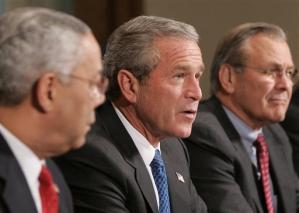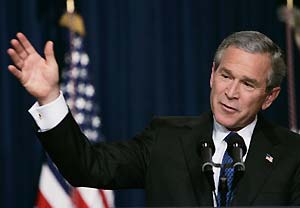 |
| President Bush makes a statement to reporters as he
finishes meeting with his cabinet in the Cabinet Room of the White House,
Thursday, Nov. 4, 2004, in Washington. Left to right Secretary of State
Colin Powell, Bush, Secretary of Defense Donald H. Rumsfeld.
[AP] |
 |
|
U.S. President George W. Bush holds first news conference after reelection, at
the White House compound in Washington, November 4, 2004.
[Reuters] |
"
At a news conference two days
after winning his second term, Bush also said his administration would "achieve
our objectives" in Iraq. He said that meant Iraqi "elections on the path to
stability."
Bush sidestepped questions about changes in his Cabinet and potential
vacancies in the Supreme Court, where Chief Justice William
Rehnquist recently disclosed he was undergoing treatment for thyroid
cancer.
"I haven't made any decisions on the Cabinet yet," Bush said. Nor about his
top staff, he added. Changes are widely expected in both, possibly at the
Justice Department, the State Department and elsewhere.
As for the nation's highest court, he said, "There's no vacancy for the
Supreme Court and I will deal with a vacancy when there is one."
Bush fielded questions after securing re-election in a campaign framed by the
war in Iraq and economic issues at home. Nearly complete returns gave him 51
percent of the popular vote — a contrast to 2000, when he lost the popular vote
but won the Electoral College.
For the second straight day, he pledged to reach out to those who opposed his
re-election.
"The campaign over, Americans are expecting a bipartisan effort and results.
I will reach out to every one who shares our goals," he said.
"Democrats want a free and peaceful world," he said at one point.
Bush's leadership of the war on terror was a flashpoint in his campaign with
Democratic Sen. John Kerry, and the subject of criticism overseas, as well. But
the chief executive signaled he intended to stay the course.
"There is a certain attitude in the world by some that says that it's a waste
of time to try to promote free societies in parts of the world. I've heard that
criticism," Bush said. "Remember I went to London to talk about our vision of
spreading freedom throughout the greater Middle East and I fully understand that
that might rankle some and be viewed by some as folly."
He opened his first post-election news conference by prodding the lame duck
Congress that meets later this month to send him an overdue spending bill. He
also called for approval of legislation to overhaul the nation's intelligence
apparatus to help protect against another attack.
Turning his attention to the new Congress that will convene in January, he
said he wanted legislation to fundamentally reorder Social Security and the tax
system. Republicans increased their majority in the Senate and the House in
Tuesday's elections.
"I earned (political) capital in the campaign and now I intend to spend it,"
he said. "And I'm going to spend it for what I told the people I would spend it
on."
The president began his day by meeting with his Cabinet. After the news
conference, he looked ahead to a weekend trip to Camp David, where he said he
would consider personnel changes for the second term.
"It's inevitable there will be changes," he said, adding that speculation
about switches were a "great Washington sport."
He cautioned against participating in it, saying he hadn't made any
decisions.
Despite his remarks on domestic affairs, Iraq, the war on terror and other
foreign policy issues are certain to occupy much of the president's time.
Bush was still taking questions when the world learned of the death of
Palestinian leader Yasser Arafat in Paris.
"God bless his soul," the president said when a reporter told him the news.
"My second reaction is that we will continue to work for a free Palestinian
state that's at peace with Israel."
A minority president no more, President Bush sketched a second-term agenda
Thursday that includes tax overhaul and major changes in Social Security to
allow workers to own their own retirement accounts.
At a news conference two days after winning his
second term, Bush also said his administration would "achieve our objectives" in
Iraq. He said that meant Iraqi "elections on the path to stability."
Bush sidestepped questions about changes in his Cabinet and potential
vacancies in the Supreme Court, where Chief Justice William Rehnquist recently
disclosed he was undergoing treatment for thyroid cancer.
"I haven't made any decisions on the Cabinet yet," Bush said. Nor about his
top staff, he added. Changes are widely expected in both, possibly at the
Justice Department, the State Department and elsewhere.
As for the nation's highest court, he said, "There's no vacancy for the
Supreme Court and I will deal with a vacancy when there is one."
Bush fielded questions after securing re-election in a campaign framed by the
war in Iraq and economic issues at home. Nearly complete returns gave him 51
percent of the popular vote — a contrast to 2000, when he lost the popular vote
but won the Electoral College.
For the second straight day, he pledged to reach out to those who opposed his
re-election.
"The campaign over, Americans are expecting a bipartisan effort and results.
I will reach out to every one who shares our goals," he said.
"Democrats want a free and peaceful world," he said at one point.
Bush's leadership of the war on terror was a flashpoint in his campaign with
Democratic Sen. John Kerry, and the subject of criticism overseas, as well. But
the chief executive signaled he intended to stay the course.
"There is a certain attitude in the world by some that says that it's a waste
of time to try to promote free societies in parts of the world. I've heard that
criticism," Bush said. "Remember I went to London to talk about our vision of
spreading freedom throughout the greater Middle East and I fully understand that
that might rankle some and be viewed by some as folly."
He opened his first post-election news conference by prodding the lame duck
Congress that meets later this month to send him an overdue spending bill. He
also called for approval of legislation to overhaul the nation's intelligence
apparatus to help protect against another attack.
Turning his attention to the new Congress that will convene in January, he
said he wanted legislation to fundamentally reorder Social Security and the tax
system. Republicans increased their majority in the Senate and the House in
Tuesday's elections.
"I earned (political) capital in the campaign and now I intend to spend it,"
he said. "And I'm going to spend it for what I told the people I would spend it
on."
The president began his day by meeting with his Cabinet. After the news
conference, he looked ahead to a weekend trip to Camp David, where he said he
would consider personnel changes for the second term.
"It's inevitable there will be changes," he said, adding that speculation
about switches were a "great Washington sport."
He cautioned against participating in it, saying he hadn't made any
decisions.
Despite his remarks on domestic affairs, Iraq, the war on terror and other
foreign policy issues are certain to occupy much of the president's time.
Bush was still taking questions when the world learned of the death of
Palestinian leader Yasser Arafat in Paris.
"God bless his soul," the president said when a reporter told him the news.
"My second reaction is that we will continue to work for a free Palestinian
state that's at peace with Israel."